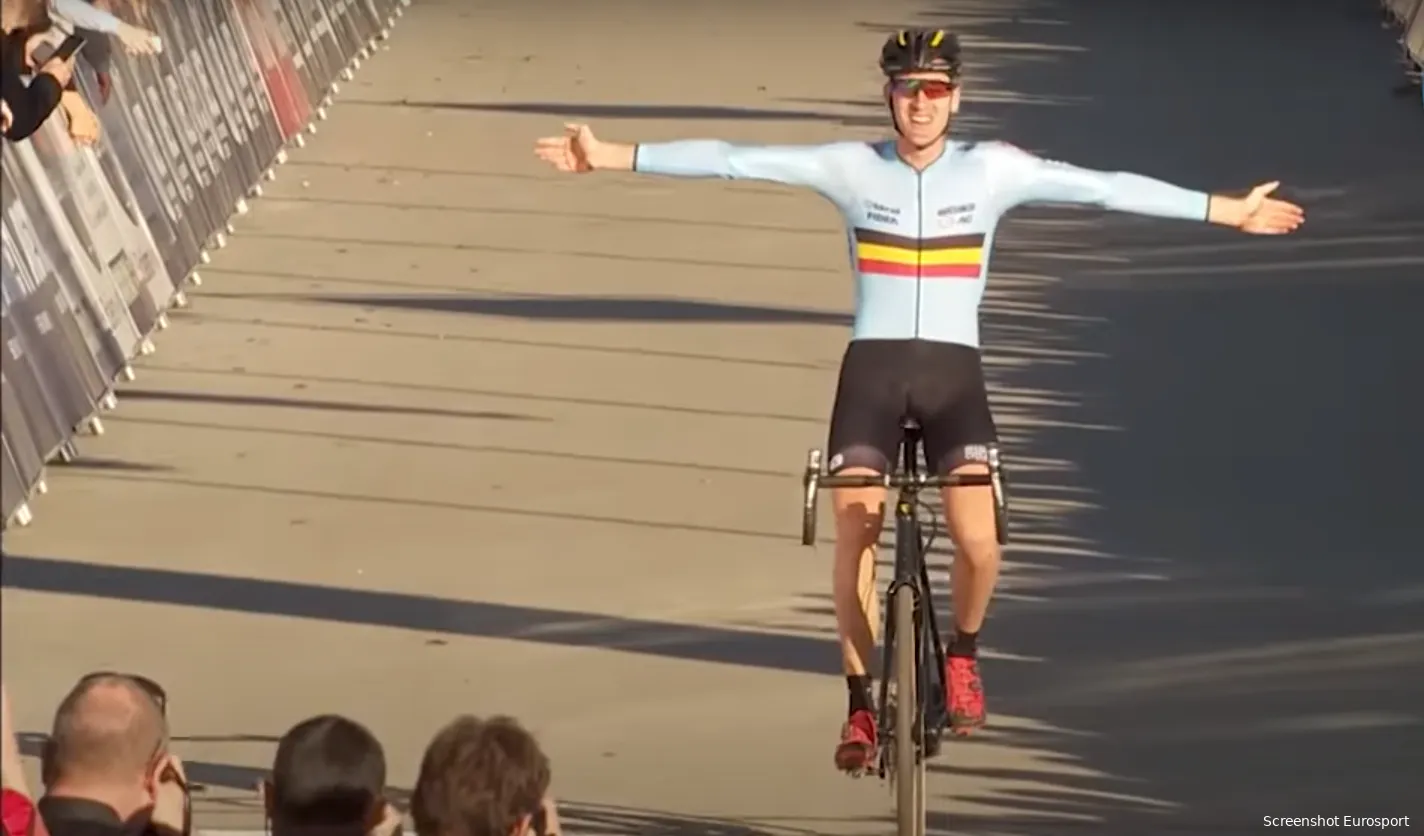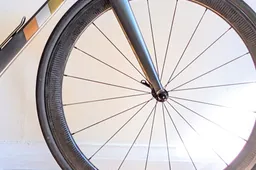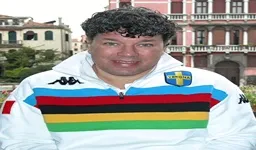🎥 "Van der Poel and Van Aert mainly did not want to let each other win": what does the 2016 European Championship teach us about this edition?
Cycling
Due to the bad weather this weekend, several parts of the European Cyclocross Championships have been postponed by a day. That gives us plenty of time to once again preview the race, which is now scheduled for Sunday. Or, in this case, we'll be previewing by looking back. Let's take a flight back in time to 2016, when a young Toon Aerts surprisingly crowned himself the winner on the French course. Afterwards, the then 23-year-old Aerts was moved to tears on the podium, flanked by second and third place finishers Mathieu van der Poel and Wout Van Aert.
Anyone who looks back at the footage of the 2016 European Championships will notice the Belgian contingent's overall superiority. Time and again, a rider clad in blue was able to launch an attack. Because Lars van der Haar was not at his best that day, Van der Poel, who was of course one of the top favorites along with Van Aert, had to fend off all the Belgian attacks by himself. And yes, that can only last so long. The gap Aerts made was decisive. Tactics can truly go a long way on the French circuit, given that the course is perfectly suitable in that way.
Aerts: "I had to ride a strong time trial to win"
The circuit has been used in almost the same form for thirty years. The barriers, both on the flat and in the climb, offer a choice to dismount or to continue riding. Furthermore, the road is wide, the corners are spacious, and the climbs are fair. Those who have power can push through on these sections and easily overtake opponents. In short, you can make your opponents work by opening the attack one by one as a team. So, is the key to success purely tactical in Pontchateau?
If we are to believe the winner from back then, not entirely. At that time, Aerts made his move as the third Belgian, after Laurens Sweeck and Michael Vanthourenhout had been caught by the Dutch. "Van Aert and Van der Poel mainly did not want to let each other win," Aerts is quoted by Sporza. "That was lucky for me, although it wasn't a purely tactical cross. I had to ride a strong time trial myself to win."
Pontchateau resistant to severe weather?
Then there's the influence of the weather. It's been rainy all week in Western Europe. It's no coincidence that the races were moved from Saturday to Sunday. However, if we are to believe Aerts, the impact of the weather will remain limited. "The course is on a sloping meadow. Just like in Overijse. There too, a mud pool was expected, but it was actually quite dry," observed Aerts. "It's not a course like the Koppenberg. You won't get deep mud there."
The Dutch national coach Gerben de Knegt also does not expect the circuit in Pontchateau to be completely rained out, but he is clear about the consequences in case of a mud fest: "The result of that is that you will have a fair race, in which the best will win. That naturally ranks the riders, so to speak." In short: whoever forms a strong block has several cards to play. But power and endurance will ultimately determine who can call themselves the European Champion on Sunday.
Tour Down Under

📸 Van der Hoorn does some soul searching in New Zealand with an impressive two-week journey

Participants Tour Down Under 2025 | UAE Team Emirates-XRG to debut four riders in Australia!

Preview Tour Down Under 2025 | WorldTour riders like kangaroos: read to jump-start!

Visma | Lease a Bike forced to make last-minute change for Tour Down Under, Vermote will participate

Drama surrounding Caleb Ewan: Sprint star has suddenly been removed from the Jayco AlUla website
Latest Cycling News

Laporte aims for a Monument victory; Benoot believes Visma’s spring squad —if fit— is stronger than ever

Cautiously positive news for Amstel Gold Race, Olympia's Tour, Renewi Tour, and Simac Ladies Tour: Motorcycle officers potentially available

An ambitious yet transitional year: how the Visma | Lease a Bike women's team plans to make Plugge's goal a reality

Van der Poel riding on tires from well-known Formula 1 brand until end of 2029: "I’m very happy with them"

Vollering encourages her followers: "Trust me, you can do it too!" while training for new season in a winter wonderland
Popular Cycling News

Pidcock’s younger brother shares emotional message: "It was like having to learn everything in life at 21"

How Jonas Vingegaard believes he can challenge Tadej Pogacar in 2025 precisely because of his heavy crash

Meanwhile in the peloton | Pidcock and Alaphilippe receive wildcards for Omloop, Unibet Tietema Rockets also present

Dutch riders from Visma | Lease a Bike not in the Tour, and the bikes of Van Baarle and Campenaerts play a role in this

While the Giro tempts him with a perfect opening weekend, Van Aert shares new footage of his knee
Latest Comments
- If she thinks talent alone will put her there she will not see many podium finishes much less a GC finish.....work as a team utilizing tactics to consistently be at the top.Germanrazor10-01-2025
- This was very informative! Luiz Antonio Duarte Ferreiraluizantonioduarteferreira02-01-2025
- Well explained, thanks for the clarity! Daniel DantasDanieldantas20-12-2024
- This is the kind of 'news' that belongs in a cheap tabloid. No matter how boring the offseason gets, nobody wants to read this.
 santiagobenites19-12-2024
santiagobenites19-12-2024 - I wish we could have seen him try. He'd absolutely get dropped before Pogi overtakes his domestiquesVeganpotter10-12-2024
- Talk is cheap! Next year barring crashes with a healthy team... all well be on track! Some need to talk to make a headline!mootman27-11-2024
- I do not see this event listed on HBO Max Sports Online? Can anyone confirm? Thanks!
 MrYuck23-11-2024
MrYuck23-11-2024 - It seemed that he was focusing forward at the time of the crash, after seeing a quick video snippet. But one thing I think he should focus on more intently is breaking a bad habit he has, right now. And that is his constant looking over his shoulders. He does that so much, that I am very sure it is not good for him. Simply watch videos of the greats of CX and you will see very little of that constant looking over their shoulders. That is a behavior that betrays a bit of insecurity on his part. He shouldn't be so concerned, incessantly, about what is over his shoulder. He needn't worry they didn't all disappear. He neds to keep his focus more ahead of himself, and he needs to pay a bit more attention to himself, in a confident manner. It is very frustrating to watch, because it is apparent that he has a lot of potential, and is in much better shape thwan many of his competitors, but the mental game needs to be sharpened more, because that part of strategy plays a huge part in the final results
 reemmo022-11-2024
reemmo022-11-2024 - hahahaha love this shit! I didnt even watched the race, but reading all the gossip articles of how stupid this is!Zatoichi19-11-2024
- Van Aert is really handsome. He can influence me all day! Ditto for Philipsen. Why do you think many of us love cycling?: to see heroic attempts at climbing mountains at high altitudes or to watch speedsters sprint for the finish line or to watch a human being ride at break neck speed down a tricky descent? No, it's all about their lean physiques and muscular legs. (apologies for objectifying these dedicated and amazing athletes).BarwonHeadsUp25-10-2024